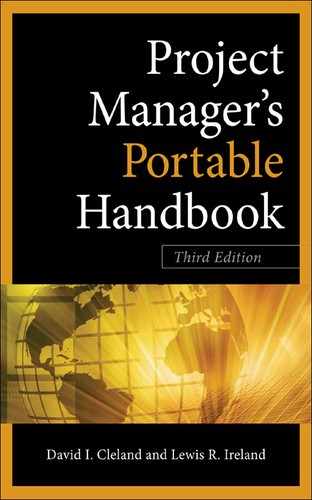PREFACE
,According to Fortune magazine, “Project Management is going to be huge in the next decade . . . project management is the wave of the future.” Truly, project management is an idea whose time has come, and its future is most promising. The interest and emphasis on project management as the management system of choice is growing throughout many industries and businesses.
The continuing growth and acceptance of project management as the system of choice for managing change dictates that people have ready access to current information on the concepts and practices. One manager voiced his satisfaction with this Handbook by announcing at a meeting, “Don’t leave home without it!” The authors take this one step further and say, “Don’t go to work without it!”
Project management has grown over the past 60 years through the dedicated efforts of practitioners and academicians. Practitioners have worked through the processes and developed on an empirical basis many of the practices that are in use today. Academicians have conducted research to find better methods for project performance. Both the practitioner and the academician have contributed to the thousands of articles and hundreds of books that describe project management theory and practice.
Many professional associations have been started to promote project management and provide a forum for the interchange of project information. These associations have provided a means of publishing and distributing project information as well as providing other services. The largest and best-known project management professional association is the Project Management Institute of Newtown Square, Pennsylvania.
Today, the abundance of literature on project management has eclipsed the ability of busy people to find a single source to keep them abreast of the fundamental knowledge, skills, and attitudes required to manage projects. These individuals need a relevant, concise, and pragmatic source of information on how to manage projects. This Handbook is dedicated to that purpose.
As the theory and practice of project management continue to expand, new topic material appears. These new topic areas have been integrated into this third edition of the Project Manager’s Portable Handbook.
This Handbook provides a single source of key summary information on the current theory and practices of project management. Users of this Handbook would most likely be managers, project managers, project management practitioners, and teachers and students of project management. Users may range from the seasoned project manager to the newly assigned practitioner.
This Handbook is designed to be easy to use, with readily available information. As a reference source, it will provide practical information in summary form on how to define, design, develop, and produce project results. Its size provides an easy-to-carry ready source of pertinent project management information. This Handbook is an everyday working document to provide practitioners key information on project management.
Contemporary theory and practice of major project topic areas provide the building blocks on knowledge. The summary content of this Handbook avoids the fluff and expanded narrative used to describe topics in the existing project management books. The use of tables, models, and callout boxes to show information further contributes to the condensed form of information. Considerable effort has been made to distill the information to the most compact form.
David I. Cleland, Ph.D.
Lewis R. Ireland, Ph.D.
